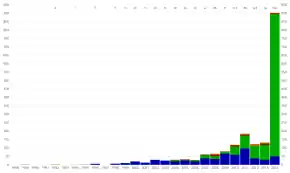
Number of exoplanets classified by method of discovery
The Open Exoplanet Catalogue is a catalogue of all discovered extra-solar planets. It is a new kind of astronomical database decentralized and completely open.[1][2][3]
It is considered one of the four exoplanet catalogues most widely used, together with the Extrasolar Planets Encyclopaedia, the NASA Exoplanet Archive, and the Exoplanet Data Explorer.[4]
In 2012, Hanno Rein presented a new kind of astronomical database based on small text files and a distributed version control system.[5]
In 2016, Ryan Varley presented ExoData, Python interface and exploratory analysis tool for the Open Exoplanet Catalogue.[6]
Statistics
As of October 2020, the Open Exoplanet Catalogue has the following statistics:
| Number of confirmed exoplanets | 4319 |
|---|---|
| Total number of planets (including Solar System objects and unconfirmed exoplanets) | 4441 |
| Number of planetary systems | 3261 |
| Number of binary systems | 159 |
| Number of commits | 19312 |
References
- ↑ "Open Exoplanet Catalogue". www.openexoplanetcatalogue.com. Retrieved 2020-10-15.
- ↑ Perkel, Jeffrey (2016-10-06). "Democratic databases: science on GitHub". Nature News. 538 (7623): 127–128. Bibcode:2016Natur.538..127P. doi:10.1038/538127a. PMID 27708327. S2CID 4450829.
- ↑ Alei, E.; Claudi, R.; Bignamini, A.; Molinaro, M. (2020-04-01). "Exo-MerCat: A merged exoplanet catalog with Virtual Observatory connection". Astronomy and Computing. 31: 100370. arXiv:2002.01834. Bibcode:2020A&C....3100370A. doi:10.1016/j.ascom.2020.100370. ISSN 2213-1337. S2CID 211032053.
- ↑ Bashi, Dolev; Helled, Ravit; Zucker, Shay (2018-08-29). "A Quantitative Comparison of Exoplanet Catalogs". Geosciences. 8 (9): 325. arXiv:1808.10236. Bibcode:2018Geosc...8..325B. doi:10.3390/geosciences8090325. ISSN 2076-3263. S2CID 73600456.
- ↑ Rein, Hanno (2012-12-04). "A proposal for community driven and decentralized astronomical databases and the Open Exoplanet Catalogue". arXiv:1211.7121 [astro-ph.EP].
- ↑ Varley, Ryan (2016-10-01). "ExoData: A Python package to handle large exoplanet catalogue data". Computer Physics Communications. 207: 298–309. arXiv:1510.02738. Bibcode:2016CoPhC.207..298V. doi:10.1016/j.cpc.2016.05.009. ISSN 0010-4655. S2CID 7697127.
This article is issued from Wikipedia. The text is licensed under Creative Commons - Attribution - Sharealike. Additional terms may apply for the media files.